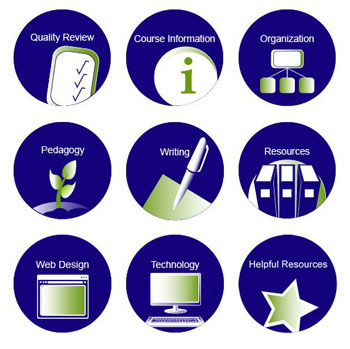eCampusAlberta Quality Rubric for Online Courses
Published by: WCET | 3/18/2015
Published by: WCET | 3/18/2015
A long time supporter of WCET, we are delighted to hear from Tricia Donovan, executive Director of eCampusAblerta today. Thank you, Tricia, for sharing with us eCA’s work in developing the quality eToolkit.
 eCampusAlberta is a consortium of 26 publicly funded post-secondary institutions in Alberta.
eCampusAlberta is a consortium of 26 publicly funded post-secondary institutions in Alberta.
From its inception, the consortium was established to increase access to high quality online learning offerings across the province of Alberta. Set in a backdrop of strong institutional autonomy, the advent of a senior executive-led initiative required unprecedented institutional collaboration. Participating institutions sought ways to inform their efforts to collaborate, and the development of eCA Quality Standards became a mechanism to facilitate trust and inspire shared practices across member institutions.
Work on quality began shortly after the consortium was formed. In 2005, members developed a position paper on Quality Standards which was primarily adapted from the widely heralded Quality on the Line: Benchmarks for Success in Internet-Based Distance Education, published by The Institute for Higher Education Policy and Blackboard, May 2000.
The Quality Standards were used as a requirement for access to funding for online curricula and eventually became adopted or adapted for design at many of the member institutions. In 2007, further development of the standards resulted in a suite of resources to support the development of online curricula through what was known as the eCampusAlberta Quality Suite. The suite included a set of Essential Quality Standards, a Quality eRubric, a Curricula Assessment Scorecard and a Course Review and Report Process.
In 2012, eCampusAlberta evaluated the eCA Quality Suite in terms of effectiveness, usage, and alignment with current academic literature on quality of online courses. Emphasis was placed on determining if revisions of our Quality Suite were needed or if we would benefit from adopting an existing external set of quality standards.
An intensive review of more than 40 online course quality standards was conducted, as well as a literature review of quality standards, quality assurance principles, processes in higher education and online learning in many jurisdictions. We also surveyed our eCA Quality Suite users and eCA course reviewers and consulted with experts in online course development.
We found that there was a strong correlation between other established quality standards and the eCampusAlberta Quality Suite and high levels of awareness/usage of and satisfaction with the Quality Suite. And we also identified areas in which additions and improvements were needed.
We determined that our standards were robust and held up well against others in the field and we worked on process revisions and updates to support the use and application of the standards.
The links below provide access to our Quality Suite of materials, all of which is licensed under Creative Commons and we encourage WCET members to use our work. The OERu has adopted our Quality Standards globally and they are currently being reviewed for applicability with open educational resources.
In July 2014, we launched the eCampusAlberta Quality Suite 2.0. The suite is comprised of the Essential Quality Standards, the eLearning Rubric, the Quality eToolkit, an online review and database system, and many quality-related professional development resources and opportunities. We also introduced three levels of achievement on the quality standards – expanding beyond those standards deemed Essential to include those identified as Excellent and Exemplary. This initiative was viewed as a means of recognizing the work of those faculty, designers and institutions that were exceeding the minimum or essential standards to more robust design standards. It is interesting to note that where we had experienced challenges in meeting the Essential Standards across the consortium for year, many institutions are inspired to showcase their work in all three levels of the standards.
The Essential Quality Standards include a new rubric approach which offers criteria for Essential (the required level for courses to meet), Excellent, and Exemplary levels for each standard. It also includes examples of effective practice and academic references. These are licensed under a Creative Commons Creative Commons Attribution 3.0 License.
The Course Review Process guides the provision of review services to members. eCampusAlberta reviewers use the new online course review system to evaluate member courses prior to these being added to the eCA Course Catalogue for delivery. Review reports are provided to the institutions. The review process defines expectations of timelines and deliverables for all participants. As reviews are conducted, the Quality Team identifies examples of quality course design that institutions are asked to share as examples of effective practice. Some institutions have decided to create templates based on the Essential Quality Standards for their online courses, and these are reviewed upon request.
The eCampusAlberta eLearning Rubric supports the creation of quality online curriculum. Developers may use the free online rubric to self-assess their courses using the Essential Quality Standards. Their reviews can be saved and reports can be downloaded. All works are licensed under a Creative Commons Attribution 3.0 License.
 Quality eToolkit
Quality eToolkitThe Quality eToolkit hosts all of our quality resources and supports our quality services. Components include the Essential Quality Standards and their accompanying resources, the online Quality eLearning Rubric, Frequently Asked Questions, background information, information on the Course Review Process, an annually updated literature review, examples of effective course design provided by member institutions, and more.
Quality-related professional development is an ongoing activity that includes webinars, orientation sessions, articles, conference sessions, workshops, etc. The Quality Manager provides consultation with institutions as requested and customized sessions are also delivered as needed. Reviewer training is also ongoing. Webinars are also available at no cost to participating institutions and a new “Quality Corner” has been recently added to our eZine to promote dialogue and awareness of quality standards and approaches.
After one year of implementing, and hearing mixed reviews anecdotally, we initiated an evaluation process in fall, 2014. We held a workshop with a group of instructional designers, directors, faculty, and staff involved in producing quality online courses at our member institutions. Keen to learn how we could enhance our processes and the experience for members, we openly solicited feedback on the standards, the rubric and our course review process. We learned that there was overall acceptance and adoption of our standards and that many of our members had created templates to support their curricula development. We also heard about challenges arising from implementation, primarily around a lack of consistency in our reviews, tone, and approach. Collectively, we then adapted our course review approach to be more open and constructive and to provide opportunity for designers to meet with our Quality Manager to discuss a course review. An online survey will complete our evaluation of the Quality 2.0 and will publish the results in Spring, 2015.
Please contact me if you have any questions or would like to discuss our standards with our Quality Team: Tricia.donovan@ecampusalberta.ca
 Tricia Donovan
Tricia Donovan
Executive Director
eCampusAlberta
3 replies on “eCampusAlberta Quality Rubric for Online Courses”
Bravo Tricia.
Thanks for providing this exemplary Quality e-Toolkit with the bonus of a CC-license that will allow it to be modded to suit any institutional context.
Way to go!
dp
[…] eCampusAlberta Quality Rubric for Online Courses. […]
[…] A long time supporter of WCET, we are delighted to hear from Tricia Donovan, executive Director of eCampusAblerta today. Thank you, Tricia, for sharing with us eCA's work in developing the quality eToolkit. eCampusAlberta is a consortium of 26 publicly funded post-secondary institutions in Alberta. From its inception, the consortium was established to increase access to high… https://wcet.wiche.edu/2015/03/18/ecaqualityrubric/ […]